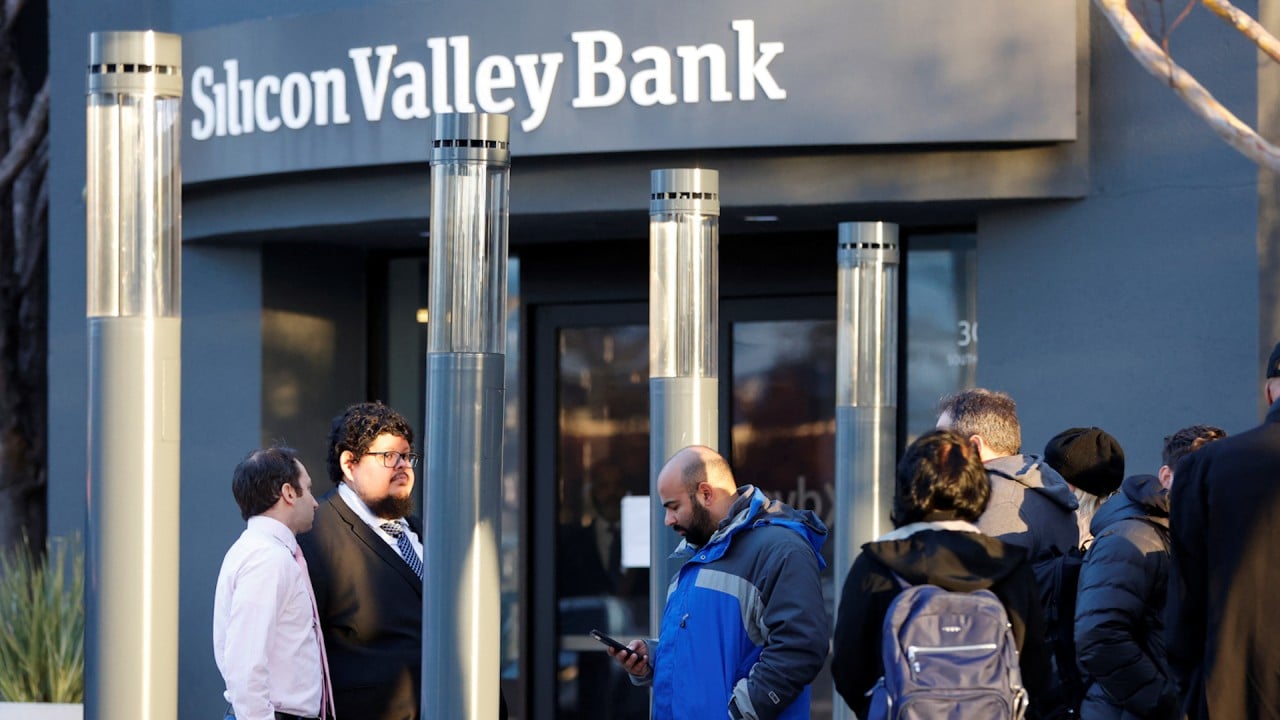
Thousands of jobs at risk as UBS seeks to integrate Credit Suisse following US$3.2 billion rescue
- UBS and Credit Suisse employed nearly 125,000 people globally at the end of 2022, including about 23,000 in Asia
- Credit Suisse had been planning to cut about 9,000 roles over three years as part of ongoing restructuring efforts before weekend rescue
UBS’s US$3.2 billion rescue of smaller Swiss banking rival Credit Suisse could put thousands of jobs at risk, including positions in Asia, as the lender looks to cut the combined company’s annual cost base by US$8 billion over the next four years.
The two companies have significant overlap in terms of their investment banking and wealth management businesses and are Switzerland’s two largest lenders. Combined, they employed nearly 125,000 people as of the end of 2022, including about 23,000 roles in Asia.
UBS chairman Colm Kelleher said it is “too early to say” in terms of the size of potential job cuts, but said UBS plans to “downsize” Credit Suisse’s investment banking business and “align it with our conservative risk culture”. The combined investment banking functions will account for no more than 25 per cent of UBS’s risk weighted assets in the future, he said.
“We will be considerate employers, but we need to do this in a rational way, thoughtfully,” Kelleher said at a press conference on Sunday night.
UBS has expressed interest in retaining Credit Suisse’s business in Switzerland and believes its wealth management arm can further strengthen its franchise. The combined company will have about US$5 trillion in invested assets.
The shotgun marriage between the long-time Swiss rivals was brokered by the Swiss National Bank, the country’s central bank, over the weekend to stave off a developing banking crisis as investors globally pulled back assets from perceived weaker lenders following the collapse of Silicon Valley Bank less than two weeks ago.
UBS’s shares fell as much as 16 per cent in Switzerland on Monday, the day after the deal was announced, but rebounded to recover most of those losses by early afternoon.
UBS takes over Credit Suisse in US$3.25 billion deal to calm markets
HSBC’s shares fell 6.2 per cent to HK$50.45, whilst crosstown rival Standard Chartered declined 7.3 per cent to HK$58.40. Both banks are based in London, but Hong Kong is their biggest market.
Credit Suisse, which has been considered one of 30 globally systemic banks, has been hit hard in recent years by trading scandals involving Greensill Capital and Bill Hwang’s Archegos Capital Management and a spying incident that led to the departure of former CEO Tidjane Thiam.
A week ago, the Zurich-based bank warned it had discovered “material weakness” in its financial reporting because of ineffective internal controls and had higher levels of outflows in assets under management in the fourth quarter, pressuring its stock and sparking additional client outflows.
Credit Suisse also was forced to tap a covered loan and short-term liquidity facility of up to 50 billion Swiss francs (US$54 billion) from the Swiss National Bank on Thursday after its biggest shareholder, Saudi National Bank, said it would not be able to inject further capital into the lender for regulatory reasons and its shares fell further.
The 166-year-old Swiss bank saw more than US$450 million in outflows from managed funds in the US and Europe over a three-day period last week, according to Morningstar Direct.

As it sought to move past its recent scandals, Credit Suisse had been in the process of a restructuring that would have seen it shed about 9,000 jobs over a three-year period and spin-off its capital markets and advisory arm under the CS First Boston brand name.
However, the cuts could be more substantial as UBS seeks to drastically reduce the size of Credit Suisse’s investment bank, essentially scrapping the planned First Boston carve out.
UBS has said it could take years to fully integrate Credit Suisse’s operations, but Kelleher said the bank would seek to keep the period of uncertainty for employees at both lenders as short as possible. The all-share transaction is expected to close in the second quarter, pending regulatory approval.
“UBS is in a much better position to execute a radical restructuring of Credit Suisse’s business than Credit Suisse was,” Morningstar research analyst Johann Scholtz said in a research note on Monday. “The restructuring will come with material costs, but UBS is better placed than Credit Suisse to absorb this. The challenge for UBS will be to keep revenue attrition to a minimum during the restructuring period.”
2023 will not turn into a repeat of 2008 crisis, Hong Kong SFC says
For both Credit Suisse and UBS, Asia has been an area of growth in recent years as they have sought to tap into rising incomes and expanded wealth in the region.
UBS generated US$943 million in pre-tax profit on revenue of US$2.56 billion in the Asia-Pacific region last year, where it employed nearly 16,500 people. The bank had “invested assets” – managed funds and customer deposits for investment purposes – of US$437 billion last year in Asia, or about 11 per cent of its invested assets globally.
The bank said in its annual report that it had a “greater concentration in Asia than many peers” and its investment bank was more heavily weighted to Europe and Asia than its peers.
On Sunday, UBS said that its strategy would remain unchanged following the merger, as it seeks to grow its operations in the Americas and Asia.
By comparison, Credit Suisse had a much smaller operation in Asia, with about 6,800 employees in the region, and about 53.4 billion francs in assets under management – its smallest region globally. The Asian business posted a pre-tax loss of 1.29 billion francs last year on revenue of 1.67 billion francs.
UBS did not immediately respond to a request for additional comment on Monday.


